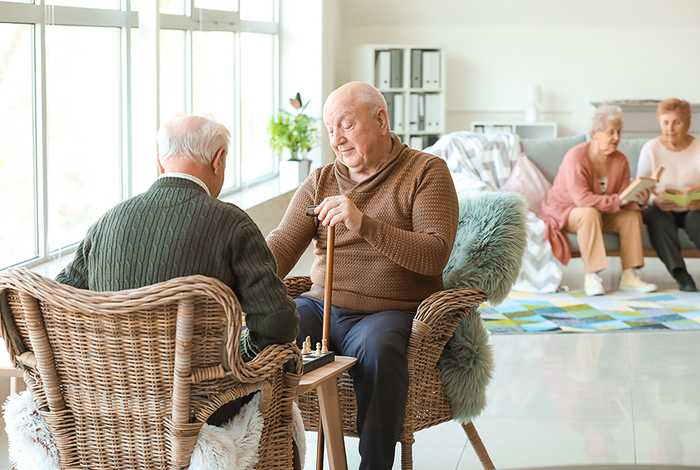Posted by Janine Griffiths
What is a memory clinic?

A memory clinic is a place designed to help when forgetfulness starts to feel like more than just a passing moment. It’s a calm, supportive environment where trained professionals gently explore what might be behind changes in your memory, thinking, or behaviour. If you or someone close to you has started to notice signs that feel a little unusual or worrying, a memory clinic is where those questions can begin to find answers.
These clinics bring together a team of specialists who each offer a different piece of the puzzle. You might meet a neurologist who understands how the brain works, a psychiatrist who can help with the emotional side of things, or a nurse who guides you through the process with warmth and clarity. Psychologists, occupational therapists and others may also be involved, depending on your needs.
The goal isn’t just to test memory but to get a full understanding of what’s going on. That might mean ruling out things like vitamin deficiencies or medication side effects, offering a diagnosis such as mild cognitive impairment or dementia, or simply providing reassurance and advice. Whatever the outcome, the aim is to support you with practical next steps and information you can trust.
Memory clinics are usually part of the NHS, though there are private options available too. Either way, they exist to help you feel more in control, offering clarity in what can often feel like a confusing time.
When might a memory clinic be right for you
It’s natural for our minds to feel a little foggy now and then. Everyone forgets the odd name, misplaces their keys, or walks into a room only to wonder why they’re there. These little slips are often just part of life and a life well-lived, at that. But sometimes, changes in memory or thinking start to feel a bit more persistent. A little more unsettling. If that sounds familiar, it might be time to gently consider whether a memory clinic could help.
There are a few signs that suggest it could be worth having a closer look. Perhaps you’ve started forgetting appointments more often than usual or noticed names escaping you that once came easily. Maybe conversations feel harder to follow, or instructions that used to be second nature now seem confusing. You might find yourself feeling a bit more withdrawn, or losing confidence in situations that once felt comfortable - even in familiar places. If you have trouble recognising someone you have known for a while, it could be another sign that something may be changing with your memory.
These things don’t automatically mean something serious is wrong. But when they start to happen more frequently, or feel like they’re affecting daily life, it’s worth paying attention. A memory clinic is not about labelling or judging - it’s about understanding. It gives you space to explore what’s going on, with professionals who take the time to listen and support you.
Taking that first step early can make all the difference. Whether the cause turns out to be medical, emotional, or something else entirely, the sooner you know, the sooner you can get the right support in place. And that can bring not just answers, but peace of mind.
What happens at a memory clinic
If the idea of visiting a memory clinic feels a bit daunting, you’re not alone. Many people feel nervous before their first appointment, often unsure of what to expect. But memory clinics are not places of judgement - they’re places of understanding. Think of it as a safe, calm setting where the focus is simply on getting to know you and how your brain is working, in as full and fair a way as possible.
Your first visit usually starts with a relaxed conversation. A healthcare professional will talk with you about how things have been lately - what’s changed, what’s stayed the same, and how memory issues, if any, have been showing up in your day-to-day life. They’ll also ask about your medical history, any medications you're taking, and your general health. It’s all part of building a picture of what might be going on, and what might be affecting how you’re feeling or thinking.
Next, you might be asked to take part in a few simple cognitive tests. These are nothing to worry about. They might involve recalling words, answering questions, or solving small problems. They’re not exams, and they’re not about catching you out. Instead, they help the team understand how your memory, concentration, and thinking patterns are working right now.
In some cases, further checks may be suggested. This could include a physical exam, blood tests, or even a brain scan. Again, these are just tools - used to rule out other causes, get a clearer picture, and guide the next steps.
Most importantly, a memory clinic is there to support you, not to test you. There’s no “right” or “wrong” outcome. The goal is to understand what’s happening in your brain, so you can make informed decisions and get the support that suits you best.
What happens after visiting a memory clinic
Once the appointment is over and you’ve had time to take a breath, the next part of the journey begins. For many, this is where a sense of clarity starts to grow. Whether you receive a diagnosis or not, the experience of visiting a memory clinic often brings with it a clearer picture and from there, the chance to make empowered, informed choices about what happens next.
Sometimes, the clinic will be able to offer a diagnosis. That might be a specific condition, or simply confirmation that your memory changes are part of the natural ageing process. In some cases, more investigations may be needed, but whatever the outcome, you won’t be left to figure it out alone. The team will talk you through what the results mean, answer your questions, and gently guide you forward.
Depending on what’s been found, the next steps could vary. You might be referred to other professionals, offered medication to help with symptoms, or given advice about helpful changes to your lifestyle. The focus is always on making life easier and more manageable, both now and in the future.
Support doesn’t stop once you leave the clinic. Many people are connected with ongoing services that can help them navigate daily life with confidence. This could include memory cafés, where people meet others going through similar things. There are charities, helplines, and counselling services available too - not just for you, but for your loved ones, who may also need a little extra support and understanding.
What’s most important to remember is this: having more information puts you in control. It gives you the chance to plan, to seek the right kind of help, and to focus on what matters most. Visiting a memory clinic isn’t the end of something, it’s the beginning of facing things with clarity, strength, and support.
What if it’s not dementia?
Facing memory worries can feel heavy, and it’s natural to fear the worst. But it’s important to know that memory changes don’t always mean dementia. There are many other reasons why your memory or thinking might be affected, and some of them are easier to address than you might expect.
Sometimes, stress or anxiety can play a big role in how our minds work, making it harder to focus or remember things clearly. Low mood or depression can also affect memory, as can physical health issues like thyroid problems or vitamin deficiencies. Even some medications have side effects that might cause confusion or forgetfulness. The body and mind are deeply connected, and changes in one area can ripple into another.
This is why visiting a memory clinic is so valuable. The team there isn’t just looking for dementia, they are dedicated to finding out what’s really happening for you. Whether it’s one of these other causes or something else, they work carefully to understand the full picture. That way, you can get the right support, treatment, or advice, tailored to your needs.
Remember, knowledge brings power. Whatever the outcome, having clear information helps you feel more in control and better prepared for the next steps. A memory clinic is a place of discovery, not just diagnosis, helping you find the path forward that’s right for you.
How to access a memory clinic
Knowing where to begin can sometimes feel like the hardest part when you’re concerned about memory. The most common and straightforward way to access a memory clinic is through your GP. Your doctor is there to listen and support you, and a quick conversation can open the door to a referral. They’ll ask about your symptoms, discuss your concerns, and if appropriate, guide you towards the right memory clinic for your area.
There are also private memory clinics available, which some people choose for shorter wait times or more flexible appointments. These can be an option if you prefer to explore assessment outside the NHS system, but it’s always worth discussing this with your GP first to understand what might suit you best.
Wait times for memory clinics can vary depending on where you live, but the teams understand the importance of timely support. While some areas may have a few weeks or months’ wait, clinics often prioritise urgent cases and offer clear information about what to expect.
Starting the conversation can feel intimidating, whether with your GP or loved ones, but it helps to be honest and straightforward. You might say something simple like, “I’ve been noticing some memory changes and want to get it checked out.” Taking this step is about caring for yourself and seeking reassurance - a move towards clarity and peace of mind.
Taking the first step
Reaching out for help with memory concerns can feel like a big leap. It’s not always easy to admit when something doesn’t feel quite right, especially when it involves something as personal and precious as your mind. But choosing to seek support isn’t a sign of weakness - it’s a sign of strength. It means you’re listening to yourself, paying attention, and taking charge of your wellbeing.
Whatever the outcome of a memory clinic visit, one thing is certain: understanding brings peace of mind. Whether it leads to treatment, lifestyle advice, or simply reassurance, having answers can help lift the weight of uncertainty and allow you to move forward with confidence.
You don’t have to take that step alone. Services like Autumna are here to walk alongside you, helping you explore your options and make sense of what comes next. From guidance on care services to support in planning for the future, there are people ready to help and to listen.
This isn’t about rushing into decisions or imagining the worst. It’s about knowing you deserve clarity, support, and care that truly meets your needs. If you’ve been wondering whether to act on those quiet questions about memory, let this be your sign. The first step is often the hardest but it’s also the one that leads to answers, support, and the chance to feel more like yourself again.
Looking for a care home?
If you are looking for a care provider, Autumna can help. It’s easy to get started. Select the type of care you need above the search bar on our homepage. You can then type in your location and press enter.
Our shortlisting tab can help you find an even more personalised list of care providers. All you have to do is just answer a few quick questions to generate a list of providers. Or if you’d rather talk through your options, our friendly and knowledgeable advisors are here to help. You can contact them on 01892 335 330. The lines are open 7 days a week.
Receive a Free Care Home Shortlist!
Let our expert team of advisers get your search off to a great start.
Tell us a little about your needs and we'll send you a bespoke shortlist of care homes! Click the button below to begin, it takes just a few minutes.
Other articles to read
From the blog

Older Persons Care Advice
Annuities for care home fees: Everything you need to know
October 23rd, 2025
Learn how annuities for care home fees provide guaranteed income, financial stability, and peace of mind when planning for long-term care costs.

Older Persons Care Advice
Care options for the elderly: What is right for you?
October 17th, 2025
Discover care options for the elderly that fit your needs, from home support to residential care, helping you plan confidently for the years ahead.

Older Persons Care Advice
Are next of kin responsible for care home fees
October 17th, 2025
Find out the truth about care costs. Are next of kin responsible for paying care home fees? Learn who pays, exceptions, and how to plan ahead.
Frequently Asked Questions
Yes, it is possible to bring a family member or friend to a memory clinic appointment. In fact, bringing someone you trust can be very helpful. They may notice changes you haven't, and their support can make the experience feel less daunting.
Yes, memory clinics usually share findings with your GP so that everyone involved in your care can stay up to date and help plan next steps together.
It varies, but the first appointment usually takes around 90 minutes. Some clinics may also offer shorter follow-up appointments, such as 30-minute progress reviews. This allows time for conversation, assessments, and any questions you might have.
It’s completely normal to feel anxious, but there’s nothing to be afraid of. Memory clinics are warm, respectful spaces created to help, not judge. You are not alone and the help you receive can make a world of difference. The help you receive can bring clarity, comfort, and a real sense of relief because understanding what’s going on is the first step toward feeling more like yourself again.
The UK's largest & most detailed directory of elderly care and retirement living options
10,297
Care Homes
11,755
Home Care Services
1,669
Live-in Care Services
1,765
Retirement Living Developments
Autumna is the UK's largest and most comprehensive later-life living & elderly care directory. Our detailed search facility and team of expert advisors can help you find the best care homes, nursing homes, retirement homes, retirement villages, home care, and live-in care services for you or your loved one's needs. Our website is free to use, we are proudly independent, and we never take referral fees.






